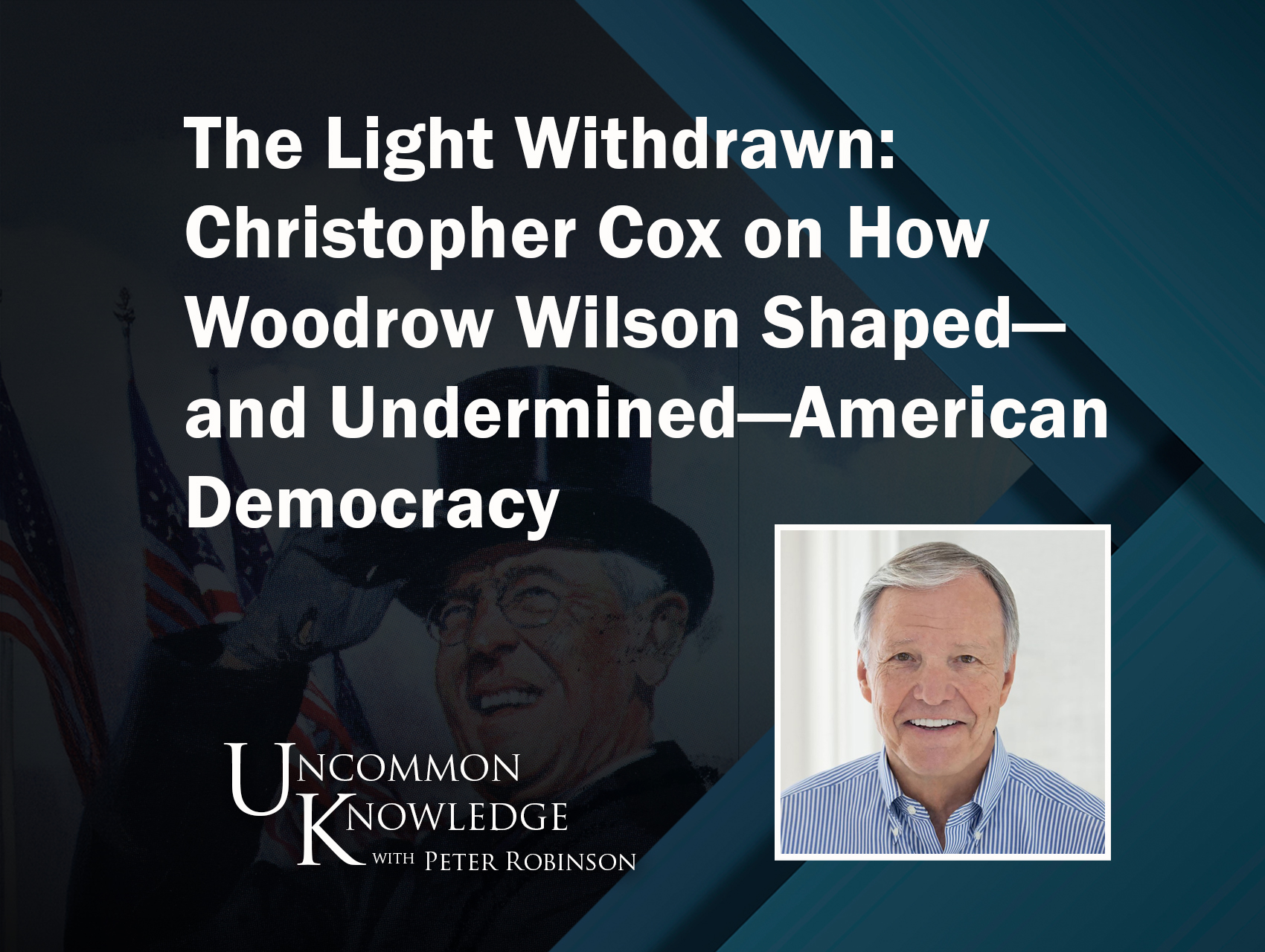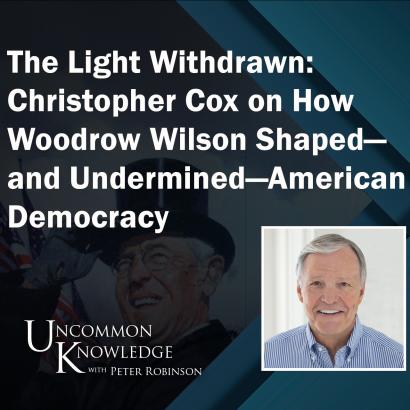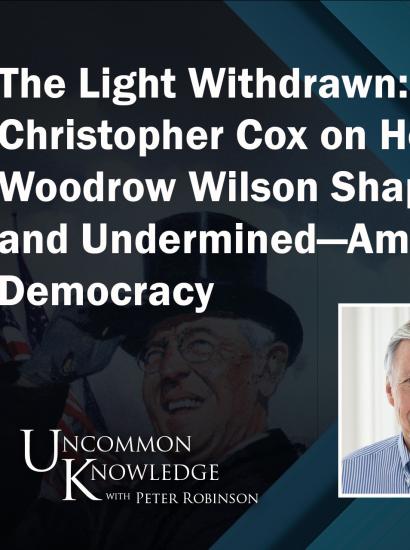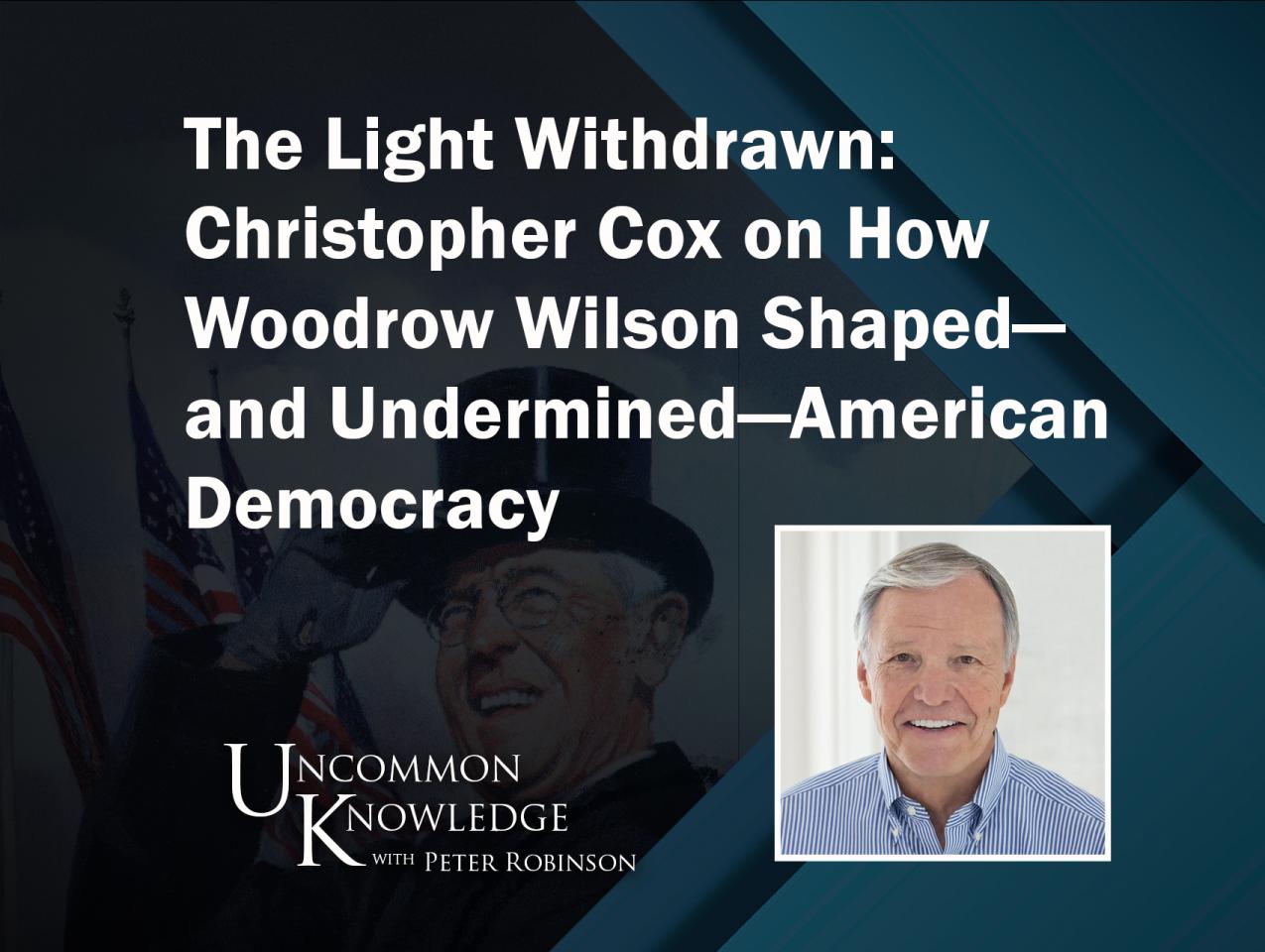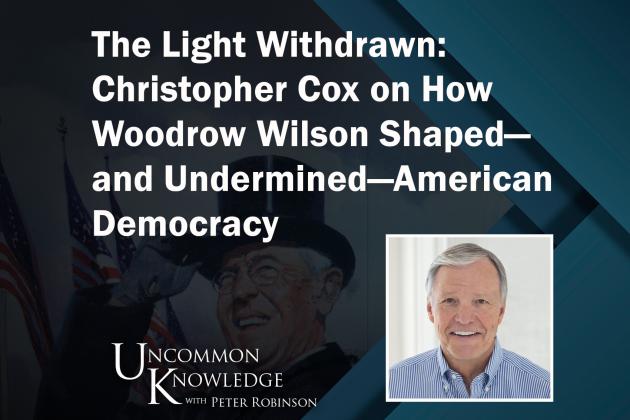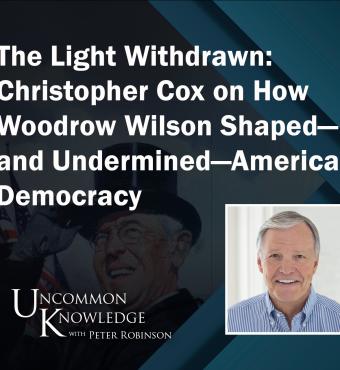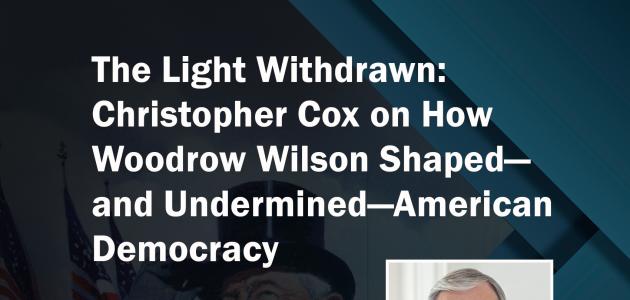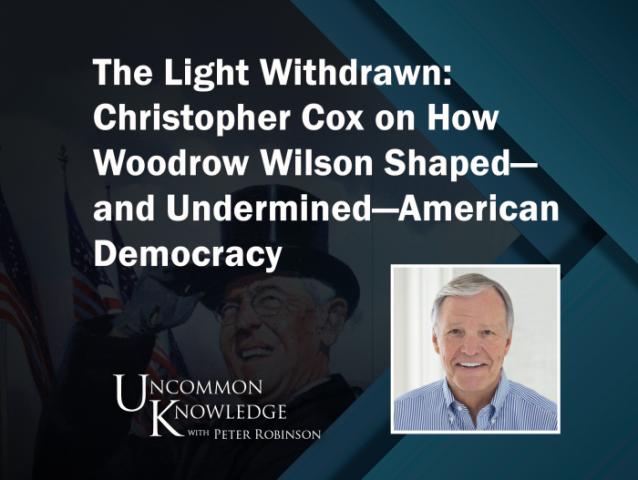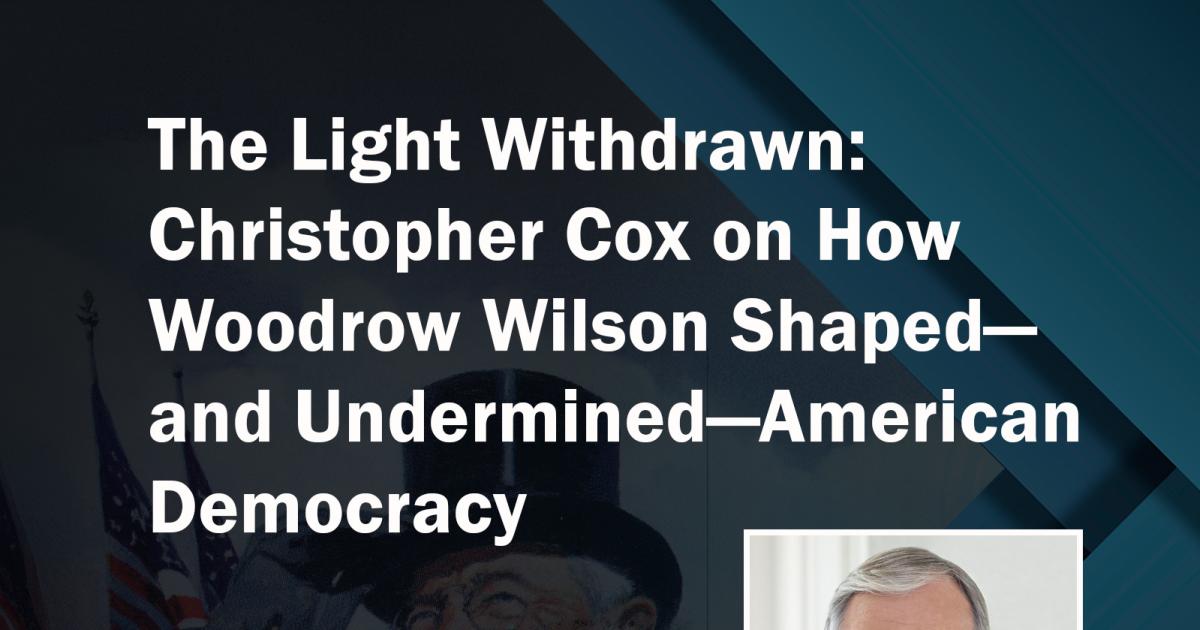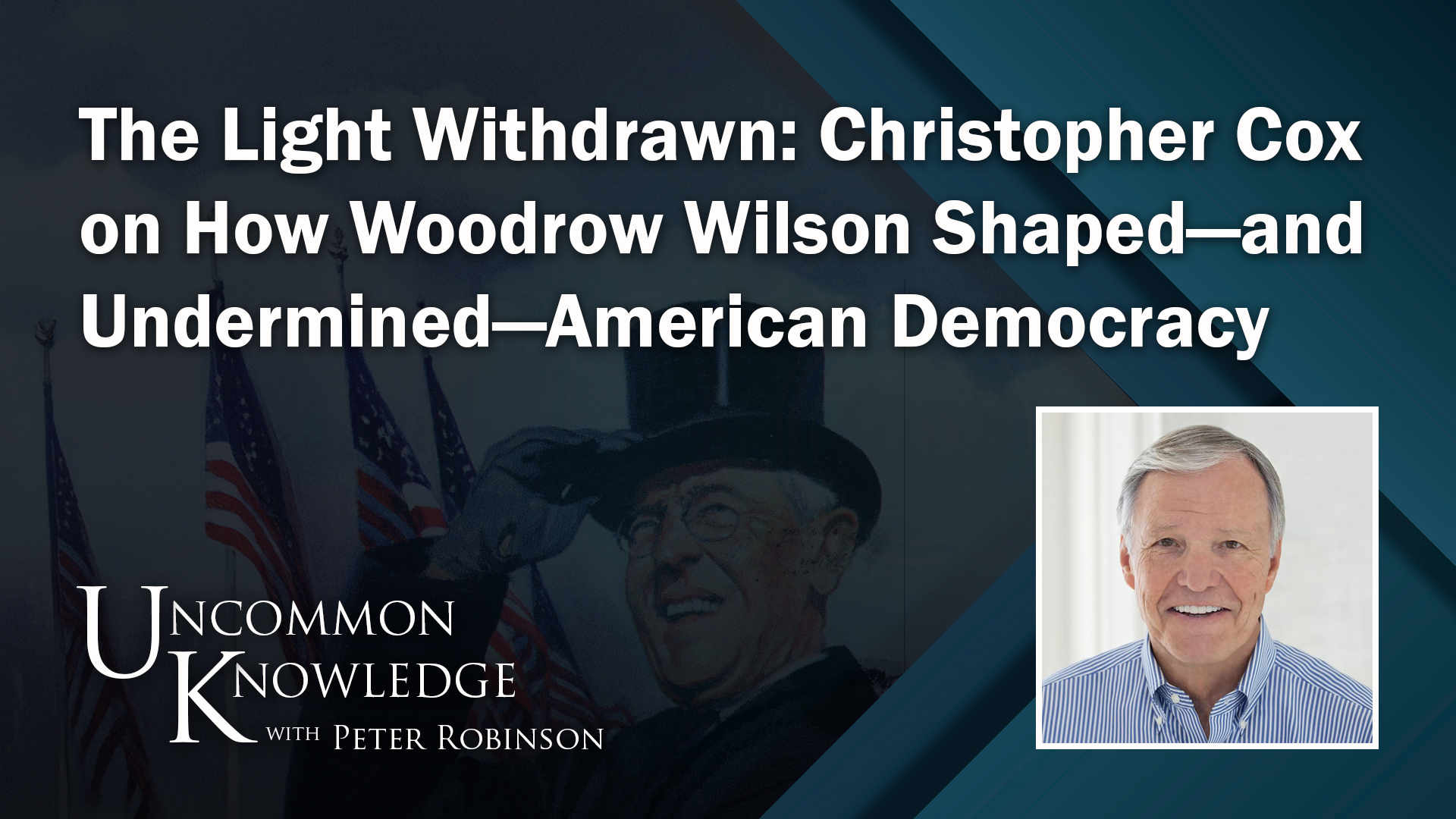- History
- The Presidency
- Revitalizing History
Was Woodrow Wilson a visionary statesman—or a reactionary bigot? Peter Robinson sits down with historian and former SEC Chairman Christopher Cox to discuss his latest book, Woodrow Wilson: The Light Withdrawn, Cox’s meticulously researched biography of the 28th president of the United States.
Together, they explore Wilson’s complicated legacy: his towering achievements as a reformer and wartime leader and his deeply troubling record on race, gender, and civil rights. From his opposition to women’s suffrage and his resegregation of the federal government to his embrace of the film, The Birth of a Nation, Cox reveals how Wilson’s Southern upbringing and elitist worldview shaped both his presidency and progressivism itself. This conversation offers a sobering reappraisal of one of America’s most consequential and controversial leaders—and asks what it means to judge historical figures by the standards of both their time and ours.
WATCH THE VIDEO
>> Peter Robinson: I'm Peter Robinson of Uncommon Knowledge. To honor the remarkable scholarship of Thomas Sowell, renowned economist, social theorist, public intellectual, and Hoover Senior Fellow, we're inviting everyone inspired by his work to enter two national contests. The Thomas Sowell Essay Contest is open to high school students and college undergraduates.
Students may explore a cultural issue or a policy issue through the lens of Thomas Sowell's work or reflect on how Thomas Sowell changed their view of the world. He certainly changed mine, I imagine he may have changed yours. The second contest, the Thomas Sowell Video Contest, is open to everybody.
It invites short, compelling videos, up to three minutes, that answer the question, what lesson or teaching from Thomas Sowell do Americans most need to learn or remember today? Winners of each competition will receive a $5,000 prize, along with paid travel and an invitation to a special celebration of Thomas Sowell that will take place here at the Hoover Institution on the Stanford University campus.
All entries are due by August 31st, let me repeat that date, that's an important one, all entries are due by August 31st. To learn more and apply, visit hoover.org/thomas-sowel-legacy, hoover.org/thomas-sowell-legacy, thank you. Woodrow Wilson, our 28th president, a great man or a misogynist and bigot?
>> Christopher Cox: Historian Christopher Cox on Uncommon Knowledge, now.
>> Peter Robinson: Welcome to Uncommon Knowledge, I'm Peter Robinson. A native of St. Paul, Minnesota, Christopher Cox holds an undergraduate degree from the University of Southern California and both JD and MBA degrees from Harvard. Mr. Cox's government service was extensive, he served in the counsel's office in the Reagan White House, where we became friends.
He represented a district in Southern California in the House of Representatives for 16 years, and he served as chairman of the securities and Exchange Commission. Since leaving government in 2009, Mr. Cox has practiced law in Southern California and turned 14 years ago? 14 years ago, to the writing of the biography published late last year, Woodrow Wilson, The Light Withdrawn.
John Greenleaf Whittier on Daniel Webster in an 1850 poem, so fallen, so lost, the light withdrawn, which once he wore. The glory from his gray hairs gone Forevermore, The Light Withdrawn.
>> Christopher Cox: The light withdrawn is.
>> Peter Robinson: Why is that the title?
>> Christopher Cox: It comes from a poem, John Greenleaf Whittier was an abolitionist poet, and he was writing about an event that shook him and abolitionists throughout New England and really across the country.
Which was Daniel Webster, Senator Webster, abolition champion, letting them down, someone whom they had put all their faith in. And the question addressed and answered in the poem is, how do you react when a political figure that you have lionized and aggrandized and thought so highly of breaks your heart?
And the answer, he said, is not to pile on and not to be angry, but sad and humble and recognize that everyone, they're all human, everyone has the opportunity to fail in various ways.
>> Peter Robinson: And most of us take the opportunity.
>> Christopher Cox: Leaders do as well.
>> Peter Robinson: All right.
>> Christopher Cox: So it struck me, writing a century after Woodrow Wilson was on the scene, that, that kind of dispassion and empathy for him and also for the other people who challenged him during his career, it was the appropriate approach.
>> Peter Robinson: All right, let's take a moment to establish just who Woodrow Wilson was.
Wilson's date, 1856 to 1924, he becomes a professor of what we would now call Political Science at the College of New Jersey, soon renamed Princeton, 12 years later, he's named president of Princeton. Eight years later, he's elected governor of New Jersey, and two years after that, in 1912, he's elected president of the United States.
Re-elected to a second term in 1916, meteoric rise.
>> Christopher Cox: Absolutely.
>> Peter Robinson: What does Wilson accomplish during his two terms as president? Well, here's the conventional view. He reduces the country's reliance on import tariffs by introducing our first federal income tax. He establishes the Federal Reserve System, he creates the Federal Trade Commission, which enables the executive branch to regulate monopolies.
He expands protections for organized labor and worker safety, he wins the First World War. He negotiates the Treaty of Versailles, for which he's awarded the Nobel Peace Prize. And although he fails to bring the United States into the New League of Nations, his design for the League serves as a model for the United nations, which the United States does join, just over a quarter of a century later, after the Second World War.
Woodrow Wilson stunning rise in politics then, one of the most consequential presidencies in American history. Christopher Cox, what the heck have you got against this guy?
>> Christopher Cox: Well, first of all, as we were just discussing with John Greenleaf Whittier's admonition to be humble as we approach these subjects of people who break our hearts, the people whose hearts were broken are all dead, as well as Woodrow Wilson is dead.
But the people in this case who were let down were not only women in America, not only Black Americans, and the people who supported them, who were their allies. But more generally, it was the whole country that paid the price for this, and we who live decades later certainly see this in much more stark relief than we would have if we'd lived at the time.
And the people who were passionately invested in these issues, and there were many of them, certainly knew better than we can now what was at stake and how difficult it was. But this was a big issue that needs to be added to the list. So the list that you itemized is pretty well known, there have been many, many biographies of Woodrow Wilson.
If you're gonna write a new biography about a president who's been covered in literally over a thousand books, you better have something new to say. What has been left out of the standard Wilson biography is his views on race and his views on sex, by the way, we call it gender today, but it was sex at the time, and it's sex in the constitution.
>> Peter Robinson: Okay, so let's go straight to that then. From The Light Withdrawn, Wilson and the suffragettes. Quote, Wilson found teaching women history and politics. And here you quote Wilson himself, about as appropriate as would be lecturing to stonemasons on the evolution of fashion, close quote. Explain that remark, explain the point.
>> Christopher Cox: Well, first of all, it's pretty straightforward, he doesn't think that women, girls, as he often called them, even though they were graduate students. Students in many cases, in some cases plenty older than he was, but he didn't believe that they had any business studying the history of government or politics.
Because they had no role, no civic role in participating in democracy that way, he had no trouble expressing these views in private. You started your description of his political career with Princeton, that was his third stop as.
>> Peter Robinson: As a teacher.
>> Christopher Cox: And he was 28 when he got his first paying job as a teacher, so there was a lot that happened before that that framed his views, he was a child of the Civil War, he was a child of Reconstruction.
>> Peter Robinson: He grew up in?
>> Christopher Cox: He was born in Virginia, grew up till teenage years in Georgia, then his family moved and he moved with them to South Carolina, then they moved to North Carolina. He then, as part of his schooling, went to the University of Virginia for one year of law school before he dropped out.
He then three years later, went to Atlanta to attempt to practice law even though he didn't have a degree, that didn't work out either, so he quit that after a year. So a lot of formative time in the south, but particularly, his years of living through Reconstruction were really important for Woodrow Wilson.
>> Peter Robinson: Okay, let's take a moment on that, his family, tell us about his family, the role they played in, well, where they stood during the Civil War, and what Reconstruction meant to their family, take a moment on that.
>> Christopher Cox: Yeah, so Woodrow Wilson had very few friends as a child and as a teenager, but he was really strongly attached to his father, he hero worshiped his father.
His father was Presbyterian Minister, went by Dr. Wilson in all quarters, even though he did not earn a doctorate anywhere. He got an honorary degree when he was a young man from a small college that nobody's ever heard of. Dr. Wilson preached to his segregated congregation that slavery, remember, we're talking about the Pre-Civil War years right now, that slavery was sanctioned by God, that it was a benefit, and in fact, should be cherished by both the master race and by the inferior race.
And the terms that he used are quite offensive to us today, but he had no difficulty expressing himself in this way. When the Civil War came, he turned his churchyard into an internment camp for Union soldiers on their way to Andersonville Prison, which is known today for its horrific abuse.
>> Peter Robinson: And this is, I'm trying to remember where this takes place because they moved from state to state in the South, this is in Virginia.
>> Christopher Cox: This is in Georgia.
>> Peter Robinson: Georgia, I'm sorry, Georgia.
>> Christopher Cox: Right.
>> Peter Robinson: All right.
>> Christopher Cox: After the Civil War and after the Reconstruction Amendments, which Wilson father strongly opposed.
And we know that the son did, too, because later on he wrote about this period in his history of the American people. He lived through it, and then he later wrote about it, so it's a wonderful thing for a biographer to have that insight. Who knows what he really thought when he lived through these things, but we know because he told us.
So after the Reconstruction Amendments, Woodrow Wilson got to say that the 15th Amendment, which allowed black men to vote, was the ruin of the South. He said similar things about every aspect of Reconstruction, including the Freedmen's Bureau, which he thought that was encouraging laziness among the former enslaved people.
He thought that they were owed nothing, apparently, as a result of being instantly turned loose on society without any training, having been the chattel of their owners. The Wilson family, and Woodrow Wilson grew up in this environment, had enslaved servants. He's the last American president to have grown up in a house with enslaved people.
So these formative years for him caused him to believe that what was called universal suffrage, at first meaning black men can vote, ultimately meaning women can vote too. That universal suffrage was the cause of all of the nation's problems, and when he was a student at Princeton, he read things that he thought were very persuasive that made the same point.
>> Peter Robinson: All right, I wanna jump back here to Wilson as a sort of founder of what we think of as the Progressive movement. So by the time he gets to Princeton, we wanna hit the progressive movement, women's suffrage, and then come back to his attitude toward African Americans, as President.
Wilson writes, as I recall, I'm recalling now, he writes a senior thesis at Princeton, or what would soon be named Princeton, in which he's very dubious about the Constitution as it stood. And says things that suggest he really would favor something closer to the British parliamentary system, where the executive has central power that can carry whatever vote it wants to carry through the House of Commons.
And then he says it more elaborately in work that he publishes, is it in the history of the American people? In any event, there's a body of thought, by the way, we should stipulate, this man was extremely articulate.
>> Christopher Cox: Yes.
>> Peter Robinson: He wrote constantly, so we have a large body of work by him, and in all kinds of ways, it's tremendously impressive, it is an internally consistent body of thought, right?
>> Christopher Cox: Got this from his father.
>> Peter Robinson: Is that so?
>> Christopher Cox: Yes, his father was.
>> Christopher Cox: A stickler for using just the right word. And one of the some people ask me, how do you stick with someone whose flaws you, writing about for 14 years as a biographer and a researcher, without liking that part of them.
But I really liked the parts in which Joseph Ruggles Wilson is instructing his son. Their correspondence back and forth and the obvious impact that it had on Wood Wilson, he was a great wordsmith.
>> Peter Robinson: All right, so he says in precise language, he lays out that he's extremely dubious of democracy, essentially, or of extending the franchise.
What I'm trying to do is be fair to him without reading back onto him what we understand progressivism, to mean, today. So I'm tempted to say he was an early technocrat, is that fair?
>> Christopher Cox: Well, I don't know.
>> Peter Robinson: Reading something back into him.
>> Christopher Cox: I don't know that technocrat quite captures it, Wilson's views on race did not change much throughout his life.
His views on women did change over time, but not so much his views on race and to sort of race to the conclusion. When we get to the Anthony Amendment, the reason that Wilson. Even though he was softened on the idea that women could be part of civic society, the reason that he opposed the Anthony Amendment was that it allowed black women to vote in the South.
It would have brought federal enforcement to the South, it would have been another 15th amendment, and he didn't like it for that reason. But his views need to be judged not by our times, not through what historians think of as presentism, but rather according to his times. And his holding out for as long as he did against women voting, and his segregating the federal government were for his own time, judged by progressives.
Many progressives, not all of them, because he had many racist progressives in his own administration, but judged by many progressives of the time, and certainly many progressive Republicans, and people of all political stripes. His actions were way out there, he was an outlier.
>> Peter Robinson: Okay.
>> Christopher Cox: And I'm sorry, I don't want to lose the point that you mentioned about his views on the structure of the government, because that relates back to Reconstruction.
>> Peter Robinson: Okay, explain that, right.
>> Christopher Cox: He hated what happened when this domineering Republican Congress forced black people, black men, voting on the South. He thought that the south should be governed by its natural leaders, the superior white men, and it sounds like I'm picking on him, but these are his own words.
And if you think about what he was proposing, first, in his very brief paper that he wrote as a senior in college, and then later on in congressional government, what he was proposing was a system that would have prevented the override of Andrew Johnson's vetoes of Reconstruction. He sort of reverse engineered the problem.
Here was Andrew Johnson who would have done the right thing, but here was the Congress that got in his way, and this Congress he described as despotic and dangerous. So the whole purpose of revising the Constitution, he wanted the President to be able to appoint the people who chaired the committees in the Congress.
Only members of the President's party could introduce legislation, and on, and on. The reason for this was.
>> Peter Robinson: It would have protected the old south.
>> Christopher Cox: He lived through Reconstruction, and it really formed a firm view in his mind that Congress is the big problem.
>> Peter Robinson: I see, I see, all right, you go through incident after incident, after incident, in which he seems to be talking out of two sides of his mouth to the suffragettes.
He seems to imply that he's with them, and then behind their backs, or in correspondence, he undermines the suffrage movement, he delays it. So let's take just a moment to set up, women's suffrage as an issue. As best I can tell it emerges as a serious political issue after the Civil War, 1880s, 1890s, but by the turn of the century.
>> Christopher Cox: 1860s.
>> Peter Robinson: 1860s, it's right up even during the Civil War.
>> Christopher Cox: Well, during the Civil War in the sense that the women who became leaders of the suffrage movement were working in war work during the Civil War, and they were working before that as abolitionists. So the connection between the abolition movement and the suffrage movement is almost complete in those decades.
>> Peter Robinson: So is it fair to say that by the turn of the century, by the Beginning of the 20th century, women's suffrage has become such a central issue in American politics that any politician of any national standing must declare on it. Is that fair?
>> Christopher Cox: Yes, at the turn of the century, that's absolutely true, it was a tipping point by that time.
But to really put a fine point on the 1860s, when Congress was considering the 14th Amendment, it was then that the first amendments were introduced to include women in the franchise. So we have Samuel Pomeroy, Senator Pomeroy from Kansas, introducing one amendment at the time, a proposed 14th amendment.
And then we have George Julian doing the same thing in the House. The 14th Amendment itself, not these separate bills introduced by these two men, in its first version that came out of the joint committee that was writing it included women.
>> Peter Robinson: And so is that the correct way to think that women's suffrage is tied in the minds of the founders of that movement to black suffrage?
That this moment of liberation is to liberate African American men, but also women in their minds? Is that fair?
>> Christopher Cox: That's not only fair, that is.
>> Christopher Cox: That's a really important point because at the Seneca Falls Convention, now we're back to 1840s, and here we have Frederick Douglass.
He's there at Seneca Falls, and he's speaking in behalf of women's right to vote, and then he takes his newspaper and runs on the mast head constantly a motto about not only race equality, but gender equality.
>> Peter Robinson: Okay, so these two go very, very much together. The light withdrawn, you've got incident after incident here of Wilson proving less than admirable, perhaps.
Wilson claimed that as president, he was powerless to advocate for women's voting rights because he lacked the prior approval of the Democratic party and its platform. It was not his place, Wilson insisted, to espouse any view not expressed in the platform. He was, he said, merely the party's spokesman.
Then Chris Cox continues to say, the transparent insincerity of Wilson's latest excuse made clear that his actual policy was ever lengthening delay. What does he think he's doing?
>> Christopher Cox: Well, he thinks he's putting it off, he means to put it off, he also means to dodge a bullet.
He doesn't wanna come straight at the problem and say, ain't ever gonna happen as long as I'm in the White House. This idea that.
>> Peter Robinson: So he's being a professional politician, he's maneuvering.
>> Christopher Cox: Yes, and I will actually give him credit, because he was able to keep changing his story about why he opposed the Anthony Minute for such a long period and got away with it, as a politician using that word with all of its potential pejorative meaning as well.
As a politician, he did more than passingly well. But the transparent insincerity comes from the fact that he had written, when he was writing about government, something very, very different about what the role of the President is. The President's role is not just to be the leader of his party, but to be the leader of the country, and the suffragists that came in to meet with him quoted those words back to him.
They didn't for a moment buy what he was saying, and he didn't either.
>> Peter Robinson: All right, okay, so let me give you a moment in history and a quotation. Here's the piece of history, it's not until 1919, this is the seventh year of Wilson's presidency, that Congress passes a women's suffrage amendment, and the Republicans give it more thoroughgoing support than do Woodrow Wilson's own Democrats.
And as you note at the time that this is enacted, Wilson is now. Not even in the country he's at the Paris Peace Conference and here's the quotation from the light withdrawn at the millennium that is the turn of the 20th to the 21st century the Gallup Organization asked the American public to name the most important event of the 20th century 66% chose quote women gaining the right to vote.
Ahead of landing a man on the moon and the fall of the Soviet Union only World War II ranked higher now here's a quotation from the Wilson Center's Global Women's Leadership Initiative. I confess I'm not even sure what all that means but here's what they have on their website Wilson's voice proved unequivocal in the ultimate passing of the 19th Amendment.
Wilson spoke fondly of its passage saying that now they're quoting Wilson, I deem it one of the greatest honors of my life that this great event should have occurred during my administration close quote. So on an issue that Americans today believe one of the most important in our history he's still seen by some as a heroic figure what's the correct way give us on this issue, how do we place this man?
>> Christopher Cox: Well Wilson speaks truthfully when he says it happened during his administration happened at the very bitter end. And it happened after his party lost control of both the House and the Senate and after he was forced by Democrats in his own party to change his view literally the night before the House of representatives by 2/3 vote approved the Anthony Amendment he was dragged across the finish line.
>> Peter Robinson: All right, but good politician that he was, he was happy to take credit for it when that served a purpose.
>> Christopher Cox: Yes, and that poll that you mentioned.
>> Peter Robinson: Yes.
>> Christopher Cox: It really is amazing that in all of the biographies that had been written about Woodrow Wilson, so little attention is paid to what at the time was the biggest domestic issue we had World War I going on of course in Woodrow Wilson's second term.
But even then, women's suffrage was fighting successfully with World War I, with the battles and all the losses and a million men in single battle and so on fighting for headlines on the front page and oftentimes kick the war onto page two.
>> Peter Robinson: I have to admit, I hadn't thought of it this way until just now but the biographies that leave out out his opposition to women's suffrage have to leave it out at least in part because they've not done a thorough job of explaining his formation as a child of the south that you bring something to bear on the question.
I mean there are certain reviews you will have been aware of this by now that, say deeply researched meticulously written but for goodness sake too much emphasis on women's suffrage or too much emphasis on Wilson's failings you've already made the point that this is what hasn't been treated and therefore needs correction.
>> Christopher Cox: It's a compliment to existing biographies.
>> Peter Robinson: All right, but at the same time unless you understand, you cannot understand Wilson's formation, his intellectual formation and psychological formation as a child of the old Reconstruction South. Unless you understand well the two go together yes the two go together if you don't if you say if, I'd rather not talk about his opposition to suffer no you have to understand that to understand him correct.
>> Christopher Cox: I think that's right and it's not just that he was a Southerner and that that had an impact on him particularly in the time that he grew up as we were discussing in Reconstruction. But it's that the movement for women's voting rights was from the first, so closely connected with abolition and with race in the final act Woodrow Wilson's opposition as I mentioned a moment ago to the Anthony men was based on race.
It was based on his deference to the Jim Crow states he wanted to protect Jim Crow And something that is newly discussed in this book, that has not appeared in even scholarly articles to my knowledge was that even after his public expression of support for the Anthony Amendment.
He then worked with Democratic senators from the south to rewrite the Anthony Amendment to protect Jim Crow to get rid of that meddlesome section two that said that the Congress shall have the power through appropriate legislation to enforce this act.
>> Peter Robinson: All right, so let's go right to Wilson on race and again this is immensely frustrating because we have here hundreds of very carefully researched and beautifully written words on Woodrow Wilson and we're whipping through it.
But this is a book and this is a different medium we do what we can here 1902, President of Princeton, Wilson publishes his History of the American People which is not a minor work five volumes is.
>> Christopher Cox: Although they're.
>> Peter Robinson: They're minor volumes.
>> Christopher Cox: They're thin volumes.
>> Christopher Cox: You might fit them into maybe not quite this book but it's a substantial work no question.
>> Peter Robinson: All right, this is you in the light withdrawn writing about Wilson's History of the American People, Wilson scolded Republicans for their sentimentality. They might believe granting civil and political rights to black citizens a sound policy, but it was only because they did not appreciate the humiliation. Quoting Wilson, the white men of the south would suffer by being put Quoting Wilson Under the Negro's heels a government quoting Wilson sustained by the votes of ignorant Negroes placed an intolerable burden on the white men of the South.
Wilson concluded it was plain to see that the troubles again quoting Wilson the troubles in the southern states arose out of the exclusion of the better whites from the electoral suffrage and the extension of the vote. To quoting Wilson, the most ignorant blacks, close quote well, you can see how somebody brings that up and the princeton board of trustees has no choice but to take Woodrow Wilson's name off the formerly Woodrow Wilson School for International Studies I guess this is very shocking.
>> Christopher Cox: Yes, and the history of the American people is loaded with it as you say there are many incidents many quotations in this book but trust me, it's not the whole my editors at Simon and Schuster said, you've made the point. And, I said yes but I don't want to be the one to make the point Woodrow Wilson is the man who's going to speak in this book, not me and so it's not ever in my voice but even slimmed down in that way, I think it's overwhelming.
>> Peter Robinson: It's hard to take okay so that's his thinking he is a racist he just believes in fundamental differences between people based on race.
>> Christopher Cox: Yeah, and it's just this is pure old fashioned. Thought experiment we can say, let's try and remove all of the bad connotations of racism and just understand what it is because Woodrow Wilson and the people in his cabinet that he personally selected were happy to describe themselves as white supremacists these days that's like nails on a chalkboard you can't whatever.
>> Peter Robinson: Your career is over at that moment.
>> Christopher Cox: Yeah, unless you're Adolf Hitler, you wouldn't be talking that way. But white supremacism was something that certainly Southern progressives. But Northern progressives, in some instances, well, The Nation magazine wrote that they were happy to see that black people would now not be part of politics any longer.
So, yeah, it's troubling, but it's real.
>> Peter Robinson: Wilson as president. Again, the light withdrawn. You're talking here about a particular cabinet meeting in 1913. This is just after Wilson takes office quote, quoting you. It was, Postmaster General Albert Burleson, he said, time to introduce racial segregation not only within his department but in all Departments of Government.
It would be a great thing, he said, and best for the negro. Wilson agreed. Following the April 1913 cabinet meeting, racial segregation spread across the federal government. Methodically, the Wilson administration removed black appointees and replaced them with white men. A 2021 study of civil service records during the Wilson administration by the National Bureau of Economic Research revealed a consistent pattern of demotions that enabled white supremacists in the Democratic Party to institutionalize segregation and relegate black Americans to low-paying, low prestige jobs.
Okay, so again, all of this is very hard to take, but it's important to draw this distinction, which I think I grasp. But I put to you, Wilson is not simply reflecting the mores and racial understanding of the country as it stood at the time. He is imposing segregation.
He is imposing racist views on a federal structure that until that point was, well, it wasn't perfect, but he moves it in a racist direction.
>> Christopher Cox: Yes.
>> Peter Robinson: There's no political pressure on him from the country at large to do this. Is that correct?
>> Christopher Cox: Yes, when Boston newspaper editor William Monroe Trotter, first black Phi Beta Kappa key holder from Harvard, came and met with Woodrow Wilson.
>> Peter Robinson: This is Wilson as president?
>> Christopher Cox: Yeah, Wilson in the White House-
>> Peter Robinson: Right.
>> Christopher Cox: To complain because he had met with Wilson when he was a candidate, when he was still governor, he met with him in Trenton. And Wilson gave every impression that he was gonna be completely fair to the race, as he called it.
And Trotter walked out of that meeting. He said he was walking on air. So, now fast forward a little more than a year, and here is Trotter in the White House saying, not until you occupied the White House has anything like this happened. For 50 years, white people and black people have been working alongside each other in the federal government.
He also recounted how Wilson's predecessors had increasingly appointed black men to increasingly important positions. And Wilson had done nothing, in fact, pulled away some of those positions that previously black people had been appointed to. So, judging Wilson by not only his own time, but the previous half century, he was reversing course.
>> Peter Robinson: All right, one other. Just to draw a, all of this is hard to take, but important. You talk about Wilson and his relationship with the movie Birth of a Nation, 1915 film, silent movie, and I'm quoting you here. Birth of a Nation was punctuated with placards or title cards, it's a silent movie.
One of these quoted Wilson's History of the American People. The card read, in Wilson's words, at last there had sprung into existence a great Ku Klux Klan to protect the Southern country, Woodrow Wilson, close quote. So, give us a moment or two on the significance of that movie and Wilson's connection to the picture and to the director, to what it stood for, that cultural moment, if we may put it that way.
>> Christopher Cox: Yeah, so the quotation comes from that the movie took from Wilson's writings, comes from history of the American people.
>> Peter Robinson: Right.
>> Christopher Cox: And it is surrounded in the history of the American people by other descriptions of the Klan that are very, very differential. The clan-
>> Peter Robinson: This is not plucked out of context unfairly.
>> Christopher Cox: No, I don't think so.
>> Peter Robinson: Right.
>> Christopher Cox: To the contrary. The reason that the movie was produced the way it was is that it is based on a book. The book was called The Clansman. The Clansman was a national bestseller, and its author was Wilson's friend and classmate from Johns Hopkins.
So Thomas Dixon, that was his name, came to the White House, met with Wilson, said, I've been working with D.W. Griffith, who, by the way, was also son of the South, Confederate sympathies and that sort of thing in his family. And his view of the substance of Birth of a Nation, the record is fairly clear, was the same as Dixon's and the same as Wilson's, although Wilson and Dixon express themselves very differently.
So they're not the same person. Dixon was advising the President on Cabinet appointments and urged him to hire Josephus Daniels, who was one of the most racist people in the entire Wilson Cabinet. That's saying a lot. So as a favor to Thomas Dixon knowing full well what the story was, because it was this national bestseller.
It had also been a stage play on Broadway, and it ran at the Liberty Theater in Broadway and had more people, I think a half million people saw it at that one location. More people than seen anything there ever. And this is almost a hop, skip, and a jump from Princeton, where Wilson undoubtedly saw it, the movie was just as controversial as the books had been.
The books were riot breeders, the Broadway shows more so, and the movie most of all. Before it it was shown in the White House in Los Angeles, where it was first a premiere, the Los Angeles City Council was horrified by it. The New York Board of Censors was horrified by it.
There are court actions hither and yon to try and join its showing because it was so horribly racist. And later on, after Wilson shows this movie in the White House, which really boosts its publicity, as you can imagine. He claimed, when a lot of pushback finally happened, that he really didn't know what the movie was about.
But he never criticized the movie, and he was given many opportunities to do so, and people begged him to do so. And throughout his life, he never said a bad thing about the movie.
>> Peter Robinson: By the way, I can't resist noting that the man we once worked for, Ronald Reagan, born in 1911, and his father, who was not a man of any great education, but his father refused to permit, Ronald Reagan and his brother Moon Reagan to see that movie.
So it's not as if it was just properly educated people who understood that it was racist. Ordinary people understood it as well. It was controversial throughout the country.
>> Christopher Cox: Yes, and in the same way that Wilson's decision to segregate the government turned the clock back, so too did his sponsorship of this movie and the movie itself, because the movie normalized the Klan.
It was a big popular movie seen by many more people than see movies today. Today we have television, we have other forms of entertainment, but that was it back then. And people sat in movie theaters that held 3,000 people and so on. And they had parties in New York with society matrons, dressed up in clan costumes and that sort of thing in the theaters.
Likewise, the ushers sometimes would dress that way. They sold a lot of tchotchke sorts of things. And in Stone Mountain, Georgia, the founder of the modern Ku Klux Klan, because, remember, the Grant administration basically did away with it. So it's been gone for a long time now. It comes back timed for the movie's opening in Georgia, and so say the people who founded it.
>> Peter Robinson: Okay, so this question. Sorry, I want to go on to Wilson today, if that makes sense. But one last question on Wilson and race and this question of following public opinion or leading public opinion, of advancing the clock or moving the clock back. Here's Frederick Douglass on Lincoln, and I'd like to ask you where Wilson fits into this, if he's simply a direct opposite.
Frederick Douglass on Lincoln and Lincoln. Douglas was cross with Lincoln. That's putting it mildly. Douglas was angry with Lincoln for many, many years because Lincoln was very slow to move against slavery per se. Lincoln's first declared war aim is to preserve the Union, and only until. Only in 1863, does he issue the Emancipation Proclamation.
Frederick Douglass, viewed from the genuine abolition ground, Mr. Lincoln seemed tardy, cold, dull and indifferent. But measuring him by the sentiment of his country, a sentiment he was bound as a statesman to consult, he was swift, zealous, radical, and determined close quote. Is Wilson just the other way around?
Is it as simple as that?
>> Christopher Cox: Yeah, I have to say that because. Because Frederick Douglass featured so strongly in the early days of the women's suffrage movement as well as the abolition movement, I really formed a great appreciation of him. He really is a kind of moral touchstone, isn't he?
In the research that I did, I mean, what an amazing person. And I think he there captures Lincoln properly, contextually, for all time. Wilson, I think if we're not looking at issues involving race or gender, might fare a lot better using that same metric. But we know from Wilson's own writings that he believed that a President is supposed to lead public opinion.
He's supposed to be muscular. The people are supposed to be putty in the leaders hands. This is what he wrote. And then when it comes to this issue where there's a great tipping point when he arrives in Washington, remember we had this big suffrage parade the day before he was sworn into his first term.
This enormous suffrage parade down Pennsylvania Avenue. So that's his moment. And he held back the tide for almost two terms.
>> Peter Robinson: All right, by the way, we just have to get in this, the final illness because of course it's in everybody's mind today. Wilson's health, in late 1919 he returns from Paris to Washington.
I'm gonna quote you on this episode. The light withdrawn. Wilson suffered a massive stroke. His left arm and leg were paralyzed. The left side of his face drooped and his digestive problems became acute. He could no longer read, sit in a chair to eat or sign his name.
Edith Wilson's wife went to extraordinary lengths to conceal the President's disability. For over four months Wilson remained in seclusion. One of Wilson's aides recorded in his diary in late January 1920 he the President, he cannot know what is going on. He sees almost nobody and hears almost no direct views.
Was there ever such a situation in our history close quote. So of now we have the 25th amendment ratified in 1967, which is supposed to give us, lays out quite straightforwardly the means for dealing with an incapacitated president. Are the two cases simply so different? Wilson's debility was extreme.
Joe Biden's is this creeping incapacity of age. Were the time so different that there's no point? There's nothing we can learn by comparing the two or are there, is there something, are there lessons to be drawn?
>> Christopher Cox: Well there's certainly cognates of one another. There are health issues involved in both.
What I'd say about the Wilson piece of that comparison is that it's well known first of all what happened to him and how badly he was affected both physically and mentally. But you have to tack that on to his physical absence from the country for six months. Prior to that, of course he left.
>> Peter Robinson: Because he was in France.
>> Christopher Cox: He left on two occasions for roughly three months each. Over six months all told, he left the United States of America, went to Europe at a time when transatlantic communication was very primitive. There was an undersea cable and we had Morse code and you had to tap, tap, tap every character and so on.
And so all of the messages were using the perfectly appropriate word, cryptic, very short. It's not as if you could send a bill overseas and the President could decide after reading it whether he wished to sign it or not, or lengthy memo discussing any subject. He was basically cut off from America, and he really was cut off sometimes when he was at se, the journey took 10 days to two weeks each way because ship to shore telephony was in its infancy.
And radio communication was often either tied up by the navigators or disturbed by weather, what have you. So literally, sometimes you just couldn't reach him at all. And then there's a six hour time difference to Paris and so on. He was paying attention only to the League of Nations and his personal items of interest in the peace negotiations when he was over there and all the domestic problems of the United States.
We didn't have a president and Congress, wasn't in session because he refused to call them into session. After he lost control of Congress, he didn't want them. He was making recess appointments. He didn't have to have judges or cabinet officers or anybody, voted on by the Senate. He didn't want them conducting oversight of how he conducted the war.
And so Congress was shut down by the President. So here we have from essentially the end of 1918 until March. Of 1921, I almost said 2021, the country operating without a president.
>> Peter Robinson: Wow, should he have resigned?
>> Christopher Cox: Yes.
>> Peter Robinson: Do we hold that against him?
>> Christopher Cox: Yes, and you didn't need the 25th amendment to know that, there was a process.
>> Peter Robinson: Marshall was his vice president. Would he have been up to the job?
>> Christopher Cox: Well, I think he was nil. Historians would say no, but they would have said that about Truman if he hadn't become president. Sometimes people surprise us. I think having a sentient being in. In charge rather than someone who is watching movies all day, as Wilson was at the end would have been a big improvement.
>> Peter Robinson: All right, Barton Swaim's review of the Light withdrawn in the Wall Street Journal. At the core of progressivism is the belief that most people lack the wisdom to govern themselves and require a class of educated elites to organize society according to a shifting set of ideals. Wilson's warped ideas on race and sex weren't departures from progressivism, but variant expressions of it, close quote.
So how much do progressives today, Bernie Sanders, Alexandria Ocasio Cortez, owe to the example of Woodrow Wilson?
>> Christopher Cox: Well, I hope they take as little as possible from the example of Woodrow Wilson on items of gender and race. But progressivism writ large, has in the brand of Woodrow Wilson built in.
>> Peter Robinson: It really does, doesn't it?
>> Christopher Cox: Woodrow Wilson, the brand, I'm saying, not because Woodrow Wilson was the best expression of progressive ideals, but because he was President of the United States and a lot of other progressives who didn't agree with his elitism were not. So for better or for worse, what progressivism is and what it's understood to be is very much influenced by Woodrow Wilson's own approach to the thing.
And Woodrow Wilson was nothing if not an elitist. He was absolutely as Bart Swaim describes of the view that we know best and so on. And when you look at his view of whether black people should be entitled to vote or to participate in even normal social arrangements in the United States, he believed that white men were superior.
And that was as obvious to him as the sun. So it's probably accusing progressivism of all of Wilson's personal sins to say that his brand of elitism is baked into the whole notion of progressivism. I think you and I, if we had another hour, could come up with a long list of progressive objectives that.
That we think are worthwhile. So unless we're being.
>> Peter Robinson: Should they. Should. Should, should progressives today Harken back, attempt to rebrand themselves as Teddy Roosevelt Progressives.
>> Christopher Cox: Well, I think I never was party to the discussions when they decided to go from liberals to progressives.
>> Peter Robinson: Yes, I thought it was an odd choice because they're.
>> Christopher Cox: It's sort of intentionally picking up all this baggage.
>> Peter Robinson: Yes.
>> Christopher Cox: There were good things about progressivism and there were bad things about it. It's an historical thing. There was a progressive party, there were progressive Republicans. You can go look it up. And why you would want to own all of it when you know you're trying to represent yourself to a 21st century audience.
I'm not sure.
>> Peter Robinson: All right, let me return to Wilson's accomplishments. He lowers tariffs, institutes the federal income tax. I'm not too happy about that. But it was a big thing. He establishes a central bank, he wins the First World War, negotiates the Treaty of Versailles, and again, although he fails to persuade the Senate to take us into the League of Nations, the League serves as a model for the United Nations.
So the argument would be that despite his flaws, and he was a man of his upbringing, which was that of the post Civil War south, despite his flaws, he is rightly considered a great president.
>> Christopher Cox: Well, the question of how to weigh Wilson, that's where I am. The President of the United States, not the man necessarily, but the eight years he had in the Oval Office in terms of his predecessors and successors as president.
In other words, the rankings is one that even after 14 years of research, I don't feel competent to address because I have a special focus in writing this story that's fundamentally about women's suffrage. And on the metrics that I chose, Wilson was not successful. He was actually taking the country in the wrong direction, according to the lights of people of his own time as well as ours.
But I also had trouble squaring, if you created the National Park Service, which he did, if you got the Clayton act signed, if you did tariff reform these are many of these things, even creating the Federal Reserve are procedural things. How do you compare that with flunking the test on human rights?
One is just much more morally infused than the other. So it's apples and oranges. And I can't say, well, he did these 12 good things and these five bad things and come up with an algorithm that says, therefore, you should be ranked 17th.
>> Peter Robinson: Okay, you're refusing to rank him.
>> Christopher Cox: This is not for lack of trying. It's not the first time I've been asked the question, but I honestly don't have a satisfactory answer to that one.
>> Peter Robinson: Okay, last question, Claire Booth Loose, do you remember Mrs. Loose? She spent her last few years in Ronald Reagan's Washington?
>> Christopher Cox: I do although I did not know her personally.
>> Peter Robinson: All right, Claire Booth Loose used to say that history would give even the greatest figures just one sentence. Lincoln freed the slaves, Churchill saved Britain. What's the sentence for Woodrow Wilson? I'll give you two sentences, Chris. Since we've known each other for a long time.
>> Christopher Cox: I could be busy.
>> Peter Robinson: All right.
>> Christopher Cox: For better or for worse, he brought us into the modern world.
>> Peter Robinson: All right, that is one that is wonderfully ambiguous. Christopher Cox, author of Woodrow Wilson, the Light Withdrawn. Thank you.
>> Christopher Cox: Thank you. It was great fun talking with you.
>> Peter Robinson: For Uncommon Knowledge, the Hoover Institution, and Fox Nation, I'm Peter Robinson.







